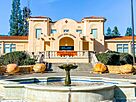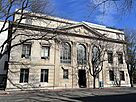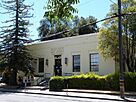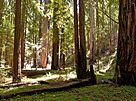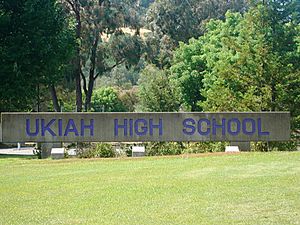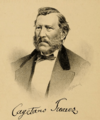Ukiah, California facts for kids
Quick facts for kids
Ukiah, California
|
||
|---|---|---|
|
Clockwise, from top left: Ukiah Civic Center, Mendocino County Courthouse, Montgomery Woods State Natural Reserve, historic downtown Post Office (closed 2012)
|
||
|
||
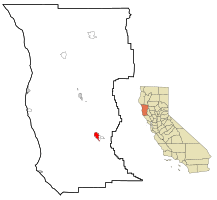
Location in Mendocino County and California
|
||
| Country | United States | |
| State | California | |
| County | Mendocino | |
| Incorporated | March 8, 1876 | |
| Government | ||
| • Type | Council/Manager | |
| Area | ||
| • Total | 4.83 sq mi (12.5 km2) | |
| • Land | 4.78 sq mi (12.4 km2) | |
| • Water | 0.04 sq mi (0.1 km2) 1.11% | |
| Elevation | 633 ft (193 m) | |
| Population
(2020)
|
||
| • Total | 16,607 | |
| Demonym(s) | Ukiahan | |
| Time zone | UTC−8 (Pacific) | |
| • Summer (DST) | UTC−7 (PDT) | |
| ZIP Codes |
95482, 95418
|
|
| Area code | 707 | |
| FIPS code | 06-81134 | |
| GNIS feature IDs | 277623, 2412125 | |
Ukiah (pronounced yoo-KY-uh) is a city in California, United States. It is the main city and county seat of Mendocino County. Ukiah is located in the beautiful North Coast region.
In 2020, about 16,607 people lived in Ukiah. The city is easy to reach along Highway 101. It serves as an important center for Mendocino County and parts of nearby Lake County. The name Ukiah comes from the Pomo word Yokáya, which means "deep valley" or "south valley."
Contents
History of Ukiah: From Ancient Times to Today
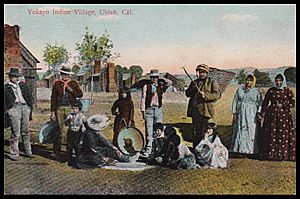
The area where Ukiah is now has been home to the Pomo people for thousands of years. The city's name comes from the Pomo village of Yokáya. This name means "deep valley" or "south valley."
Mexican Era: Land Grants and Early Settlers
Ukiah is located on land that was once part of Rancho Yokaya. This was a large land grant given by the Spanish government in what was then called Alta California. The grant was named after the Pomo word for "deep valley." The Pomo people were the original inhabitants of this area.
Later, European-American settlers changed the name "Yokaya" to "Ukiah." This became the name for the new city. Cayetano Juárez was given the Ukiah land grant. He was known for having a peaceful relationship with the local Pomo people.
The first Anglo-American settler in the Ukiah area was John Parker. He was a vaquero (cowboy) who worked for James Black. Black brought his cattle to the Russian River valley and used the land for grazing. A small blockhouse was built for Parker. This was to protect the cattle from local people who did not want settlers on their land. The blockhouse was south of today's Ukiah.
Early American Era: Growth and Connection
In 1856, Samuel Lowry built a log cabin where East Perkins and North Main streets are today. He sold his land to A.T. Perkins in 1857. Perkins and his family were the first Anglo-American pioneer family to live in the valley. Six other families moved there that same year.
The first United States post office in Ukiah opened in 1858. By 1859, Ukiah had grown to about 100 people. This made it big enough to become the county seat for Mendocino County. Before this, Sonoma County handled the county's administrative tasks.
At first, visitors could only reach Ukiah by stagecoach or on horseback. A short train line from San Francisco ended in Petaluma, which was about 80 miles (129 km) south. In 1870, the rest of the trip to Ukiah took two more days by horse. Later, the train line was extended to Cloverdale. This reduced the stagecoach trip to about 30 miles (48 km). Still, Ukiah was quite isolated and grew slowly.
Ukiah officially became a city in 1876. It wasn't until 1889 that the San Francisco and North Pacific Railroad finished its line to Ukiah. This connected the city to the national train network.
Ukiah has always been a center for farming and business. Over the years, farmers in the Ukiah Valley have grown many different crops. These include pears, green beans, hops, apricots, and grapes. Today, grapes are the most important farm product, as Ukiah is part of California's famous Wine Country.
Hops were once a very important crop around Ukiah. Hops are used to flavor beer. They were first grown here in 1868. The climate was perfect for hops, and production grew a lot, reaching its peak in 1885. Even in 1890, Mendocino County was the third-largest producer of hops in California. You can still see a restored hop kiln (a special oven for drying hops) at the north end of Ukiah.
20th Century: Redwoods and New Lifestyles
Ukiah's population grew a lot in the 1940s because of the lumber boom. Cutting down redwood trees was a major industry. However, activists worked hard to protect redwood forests, which were becoming endangered. From the 1960s, many young people moved to the area. They were looking for different ways of living, often focusing on crafts and rural life.
Geography and Climate of Ukiah
Ukiah is located in the southeastern part of Mendocino County. It sits in the valley of the Russian River. This river flows south and reaches the Pacific Ocean in Sonoma County. Ukiah is about 60 miles (97 km) north of Santa Rosa and 158 miles (254 km) south of Eureka along U.S. Route 101.
The city covers about 4.8 square miles (12.4 km2). Only a small part, about 0.05 square miles (0.13 km2), is water.
Ukiah's Climate: Warm Summers and Wet Winters
Ukiah has a hot-summer Mediterranean climate. This means it has hot, dry summers and mild, wet winters. The average rainfall is about 38.90 inches (988 mm) per year. It rains on about 77 days each year.
Temperatures often reach 90°F (32°C) on about 61 afternoons each year. They can even reach 100°F (38°C) on about 9 afternoons. Because the air is often dry in summer, temperatures usually drop into the 50s°F (10-15°C) at night. Freezing temperatures happen on about 34 mornings each year.
The highest temperature ever recorded in Ukiah was 117°F (47°C). This happened on September 6, 2022, and again on July 6, 2024. The lowest temperature ever recorded was 12°F (-11°C) on January 12, 1898. Light snow falls about every other year.
| Climate data for Ukiah, California, 1991–2020 normals, extremes 1893–present | |||||||||||||
|---|---|---|---|---|---|---|---|---|---|---|---|---|---|
| Month | Jan | Feb | Mar | Apr | May | Jun | Jul | Aug | Sep | Oct | Nov | Dec | Year |
| Record high °F (°C) | 82 (28) |
86 (30) |
93 (34) |
98 (37) |
106 (41) |
114 (46) |
117 (47) |
114 (46) |
117 (47) |
107 (42) |
92 (33) |
84 (29) |
117 (47) |
| Mean maximum °F (°C) | 68.7 (20.4) |
74.1 (23.4) |
80.6 (27.0) |
86.9 (30.5) |
94.1 (34.5) |
101.9 (38.8) |
104.6 (40.3) |
104.0 (40.0) |
102.8 (39.3) |
93.1 (33.9) |
78.4 (25.8) |
67.1 (19.5) |
107.4 (41.9) |
| Mean daily maximum °F (°C) | 56.9 (13.8) |
60.2 (15.7) |
64.8 (18.2) |
69.6 (20.9) |
76.3 (24.6) |
82.8 (28.2) |
91.1 (32.8) |
90.6 (32.6) |
87.0 (30.6) |
76.7 (24.8) |
62.8 (17.1) |
55.6 (13.1) |
72.9 (22.7) |
| Daily mean °F (°C) | 47.1 (8.4) |
49.2 (9.6) |
52.3 (11.3) |
56.0 (13.3) |
61.8 (16.6) |
67.3 (19.6) |
73.4 (23.0) |
72.4 (22.4) |
69.1 (20.6) |
61.1 (16.2) |
51.4 (10.8) |
45.9 (7.7) |
58.9 (15.0) |
| Mean daily minimum °F (°C) | 37.4 (3.0) |
38.3 (3.5) |
39.7 (4.3) |
42.4 (5.8) |
47.3 (8.5) |
51.9 (11.1) |
55.6 (13.1) |
54.2 (12.3) |
51.3 (10.7) |
45.5 (7.5) |
40.0 (4.4) |
36.2 (2.3) |
45.0 (7.2) |
| Mean minimum °F (°C) | 26.7 (−2.9) |
29.0 (−1.7) |
31.7 (−0.2) |
34.0 (1.1) |
38.8 (3.8) |
44.7 (7.1) |
49.8 (9.9) |
49.1 (9.5) |
43.2 (6.2) |
36.3 (2.4) |
29.1 (−1.6) |
25.8 (−3.4) |
23.8 (−4.6) |
| Record low °F (°C) | 12 (−11) |
18 (−8) |
22 (−6) |
23 (−5) |
28 (−2) |
35 (2) |
39 (4) |
38 (3) |
30 (−1) |
24 (−4) |
19 (−7) |
13 (−11) |
12 (−11) |
| Average precipitation inches (mm) | 7.39 (188) |
6.98 (177) |
5.33 (135) |
2.81 (71) |
1.71 (43) |
0.41 (10) |
0.00 (0.00) |
0.05 (1.3) |
0.20 (5.1) |
1.95 (50) |
4.11 (104) |
7.96 (202) |
38.90 (988) |
| Average precipitation days (≥ 0.01 in) | 12.5 | 11.9 | 10.2 | 7.8 | 5.0 | 1.6 | 0.1 | 0.2 | 0.7 | 3.6 | 9.8 | 13.7 | 77.1 |
| Source 1: NOAA | |||||||||||||
| Source 2: National Weather Service | |||||||||||||
People and Community in Ukiah
| Historical population | |||
|---|---|---|---|
| Census | Pop. | %± | |
| 1860 | 624 | — | |
| 1870 | 966 | 54.8% | |
| 1880 | 933 | −3.4% | |
| 1890 | 1,627 | 74.4% | |
| 1900 | 1,850 | 13.7% | |
| 1910 | 2,136 | 15.5% | |
| 1920 | 2,305 | 7.9% | |
| 1930 | 3,124 | 35.5% | |
| 1940 | 3,731 | 19.4% | |
| 1950 | 6,120 | 64.0% | |
| 1960 | 9,900 | 61.8% | |
| 1970 | 10,095 | 2.0% | |
| 1980 | 12,035 | 19.2% | |
| 1990 | 14,599 | 21.3% | |
| 2000 | 15,497 | 6.2% | |
| 2010 | 16,075 | 3.7% | |
| 2020 | 16,607 | 3.3% | |
| 2022 (est.) | 16,496 | 2.6% | |
| U.S. Decennial Census 1870 Census | |||
Ukiah is a diverse city with people from many different backgrounds.
| Racial and ethnic composition | 2000 | 2010 | 2020 |
|---|---|---|---|
| White (non-Hispanic) | 72.4% | 62.87% | 54.04% |
| Hispanic or Latino (of any race) | 19.31% | 27.73% | 32.78% |
| Two or more races (non-Hispanic) | 2.57% | 2.84% | 5.56% |
| Asian (non-Hispanic) | 1.64% | 2.46% | 3.0% |
| Native American (non-Hispanic) | 3.03% | 2.75% | 2.9% |
| Black or African American (non-Hispanic) | 0.89% | 0.98% | 1.04% |
| Other (non-Hispanic) | 0.06% | 0.19% | 0.54% |
| Pacific Islander (non-Hispanic) | 0.09% | 0.16% | 0.16% |
Ukiah's Population in 2010
The 2010 United States Census counted 16,075 people living in Ukiah. The city had about 3,404 people per square mile (1,314 per km2).
Most residents (72.1%) were White. About 14.8% were from other races, and 5.5% were from two or more races. People of Hispanic or Latino background made up 27.7% of the population.
There were 6,158 households in Ukiah. About one-third of these households (33.3%) had children under 18 living in them. The average household size was 2.48 people.
The population included 24.8% under 18 years old, 9.7% aged 18 to 24, and 14.5% who were 65 or older. The average age in Ukiah was 35.9 years.
Ukiah's Population in 2000
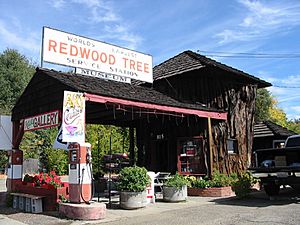
In 2000, Ukiah had 15,497 people living within its city limits. There were 5,985 households. The population density was about 3,275 people per square mile (1,265 per km2).
The racial makeup of the city was mostly White (79.5%). About 19.3% of the population was Hispanic or Latino.
About 26.5% of the people were under 18 years old. The average age was 35 years. The average income for a household was $32,707. About 18.1% of the population lived below the poverty line.
Ukiah is also a center for the surrounding communities like Redwood Valley, Potter Valley, Calpella, and Talmage. During the day, about 40,000 people work in or near the city.
Economy: What Ukiah Produces
Ukiah has several major employers that provide jobs for many people. These include:
- Mendocino County (local government)
- Ukiah Valley Medical Center (hospital)
- Walmart (retail store)
- Granite Construction (construction company)
- The Home Depot (home improvement store)
- Lucky (supermarket)
- Federal Express (shipping company)
Major Products: Wine and Agriculture
Ukiah is well-known for wine production. Many large wineries are located here, such as Brutocao, Fife, Parducci, Frey, and Bonterra.
Ukiah was also a major producer of pears. Alex R. Thomas & Company owned many acres of pear orchards. For almost 90 years, many local people worked packing pears for sale in the U.S. and other countries. In 2008, the company closed its main operations. Since then, some pear orchards have been replaced with vineyards for grapes.
Arts, Culture, and Fun in Ukiah
Ukiah has many places for arts and culture. These include:
- SPACE - School of Performing Arts and Cultural Education
- Ukiah Players Theatre
- The Mendocino Ballet
- Ukiah Civic Light Opera
- Grace Hudson Museum
- Ukiah Symphony Orchestra
- Ukiah Community Concert Association
- The Spring House
Recreation: Parks and Outdoor Activities
Ukiah offers many parks and places for outdoor fun:
- Alex R. Thomas Plaza
- Gardner Park
- Giorno Park
- Great Redwood Trail
- Low Gap Park
- McGarvey Park
- Oak Manor Park
- Observatory Park
- Orchard Park
- Riverside Park
- Todd Grove Park
- Ukiah Skate Park
- Ukiah Sports Complex
- Vinewood Park
Transportation: Getting Around Ukiah
The Amtrak Thruway 7 bus provides daily connections to and from Ukiah. You can catch the bus at 397 North Orchard Avenue. It connects Ukiah to Martinez in the south and Arcata in the north. You can make more Amtrak train connections from Martinez station.
Education: Schools and Colleges in Ukiah
Ukiah has many schools for students of all ages.
Ukiah Unified School District
- Ukiah High School
- Calpella Elementary School
- Eagle Peak Middle School (Redwood Valley)
- Nokomis Elementary School
- Oak Manor Elementary School
- Pomolita Middle School
- South Valley High School
- Yokayo Elementary School
- Frank Zeek Elementary School
- Tree of Life Montessori Charter School
- Grace Hudson Elementary School
- River Oak Charter School
- Ukiah Independent Study Academy
- Calpella Preschool
- Preschool Village
- Small Wonders State Preschool
- Yokayo State Preschool
- Ukiah Adult School
Other K–12 Schools
- Sequoia Career Academy
- Redwood Collegiate Academy
- Deep Valley Christian School
- Ukiah Junior Academy
- Instilling Goodness / Developing Virtue School
- St. Mary of the Angels Catholic School
Colleges in Ukiah
- Mendocino College
- Dharma Realm Buddhist University
Notable People from Ukiah
Many interesting people have lived in or come from Ukiah:
- AFI band members: Davey Havok (lead singer), Jade Puget (guitarist), Adam Carson (drummer).
- Phoebe Bridgers: A Grammy-nominated singer who spent part of her childhood here.
- Ed Burke: A U.S. Olympic hammer thrower.
- Melissa Chaty: Miss California in 2008.
- Shiloh Fernandez: An actor born and raised in Ukiah.
- Robben Ford: A blues guitarist who grew up in Ukiah.
- Casey Frey: A social media comedian and dancer, born and raised here.
- Sally Miller Gearhart: A feminist author and activist.
- Grace Hudson: A museum founder and photographer. The Grace Hudson Museum in Ukiah is named after her.
- Don Mossi: A Major League Baseball pitcher.
- Holly Near: A singer-songwriter born in Ukiah.
- Nick 13: Lead singer of Tiger Army, raised in Ukiah.
- Hal Perry: A professional basketball player and civil-rights lawyer.
- Aaron Rodgers: A National Football League quarterback, who spent part of his childhood in Ukiah.
- Carl Sassenrath: An architect of computer operating systems, including the Amiga computer operating system.
- William Harrison Standley: A Chief of Naval Operations and later U.S. Ambassador to the Soviet Union.
- Gary Scott Thompson: A television and film writer and producer.
- Rick Warren: A well-known pastor and author.
Images for kids
-
Cayetano Juárez was granted Rancho Yokaya by Governor Pío Pico in 1845.
See also
 In Spanish: Ukiah (California) para niños
In Spanish: Ukiah (California) para niños
 | Jewel Prestage |
 | Ella Baker |
 | Fannie Lou Hamer |


